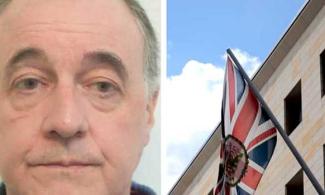
Smith, pleaded guilty to eight charges under the Official Secrets Act 1911 and 1920 but claimed he did not intentionally cause any harm.
A British embassy security guard, David Ballantyne Smith, 58, has been sentenced to more than 13 years in prison after being caught leaking secrets to Russia.
Smith, pleaded guilty to eight charges under the Official Secrets Act 1911 and 1920 but claimed he did not intentionally cause any harm.
According to Sky News, he was sentenced to 13 years and two months but can serve the term in either Germany or the UK.
Smith, from Paisley, Scotland, claimed he was depressed, lonely and drinking up to seven pints a day when he started leaking embassy secrets in an effort to cause embarrassment.
There was "ample evidence" the former RAF aircraftman was hostile towards the UK, the judge had previously said.
He made comments that denigrated Britain, Germany and the West to colleagues at the embassy in Berlin.
He also appeared to approve of Russia and President Vladimir Putin, and admitted to openly supporting Russian-backed forces in the Donbas region of Ukraine.
After a three-day hearing, Mr Justice Wall said he was sentencing Smith on the basis he had an "ongoing relationship with someone at the Russian embassy and was paid for his treachery".
David Smith showed little reaction as he was told about his fate.
Still clutching the hearing aid to his ears, he stood up and learned he would spend years in prison, BBC News reports.
As a security guard, David Smith did not have access to top-secret material in the embassy.
But the material he admitted passing on or collecting could still have been very useful for the Russians.
It could potentially have helped to identify undercover British intelligence officers at the embassy and any agents they were meeting.
Details of CCTV could also potentially have helped Russian spies to work out how to run their own operations against the embassy and collect its secrets.
Smith's lawyers disputed the prosecution's claims about his motivation but disgruntled employees historically have often been the most effective recruits for spy services.
The case may also have raised questions about the checks carried out on staff, such as Smith, that are recruited locally.